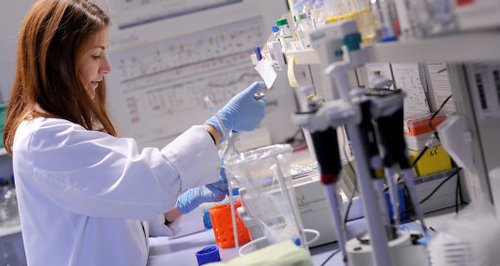Study Says Women In East Mids Waiting More Than Three Weeks For Cervical Screening Results
10 May 2019, 06:58 | Updated: 10 May 2019, 07:13

More than 1.25 million women waited too long for cervical screening results last year, data shows, as MPs accused the Government of "losing its grip" on cancer screening.
A damning report from the Public Accounts Committee (PAC) criticised NHS England, Public Health England and the Department of Health and Social Care (DHSC) for problems with cancer screening which see too few people screened for diseases such as bowel and cervical cancer.
Officials are accused of presiding over failing IT systems, some of which have had issues since 2011, while systems are not in place to track all people eligible for tests.
A lack of oversight means major issues with inviting women for screening were not picked up, while there are stark inequalities across geographical regions in who is screened and who gets test results on time.
NHS Digital figures for 2017/18, analysed by the Press Association, show that six out of 10 women in some parts of England waited longer than three weeks for results after undergoing a smear test.
This is despite NHS England saying 98% of all patients should receive test results within two weeks.
Six out of 10 women (58.7%) in the East Midlands waited longer than three weeks, as did 43.5% in the East of England.
Across England, almost one in four women (23%) waited longer than three weeks for cervical test results, with a further 18.4% of women waiting between two and three weeks.
Overall, 58.6% received results within the recommended two weeks.
In terms of numbers, 1,791,871 women in England received results within two weeks but a further 562,003 waited two to three weeks and 703,179 more waited over three weeks.
MPs said in their report that "women attending cervical screening appointments are being continually failed by screening providers" and targets are not being met.
"This delay is unacceptable and the impact of the undue stress and worry for women must be recognised," the study said.
"Our inquiry has exposed a health service that is losing its grip on health screening programmes.
The Department of Health said the 14-day target was "a customer service ambition and not actually based on any essential clinical need" but MPs said women had not been told this.
They added: "NHS England told us that some local providers currently have staff shortages, but as this target has not been met since November 2015, it is clear to us that NHS England is not managing local providers effectively."
As part of their report, MPs reviewed bowel, breast and cervical screening and screening for a condition called abdominal aortic aneurism.
Tests for this are offered to men as they turn 65.
The report found that not one single cancer programme met their targets on how many people should be screened in 2017/18.
Just 71.4% of eligible women in England underwent cervical screening despite the target being 80%, while just 72.1% were screened for breast cancer.
In 2017/18, bowel screening achieved coverage of 59.6% against a target of 60% but a new bowel scope test had only reached a third of the intended population by last September.
MPs said "national health bodies still do not know which specific barriers prevent certain groups from attending" screening, meaning they cannot "effectively target these groups to encourage them to attend."
The MPs' report comes after serious incidents were reported last year in which thousands of women were not sent invitations for breast or cervical screening.
A huge backlog of 150,000 cervical screening samples was also reported due to changes in how these samples are now being screened.
MPs said they were worried about regional issues with screening coverage, saying: "We are extremely concerned about the massive disparity around the country with some areas in the North East consistently reaching more of their eligible populations than areas of London.
"On the cervical screening programme just one out of 207 clinical commissioning group areas succeeded in meeting the target of screening 80% of its eligible population.
"There is also an overwhelming lack of understanding about local variation: the national health bodies do not know and could not tell us why performance is good in some areas and so poor in others."
The report said screening programmes rely on a single IT system, known as NHAIS, to identify the eligible population for screening.
"The IT used to identify the eligible population for screening has been unfit for purpose for screening programmes since 2011, but still has not been replaced.
"National health bodies therefore run a constant risk of not knowing if all the people who should have been identified for screening have been."
MPs said NHS England has now committed to replacing NHAIS during 2020, three years later than planned, with the "delay costing the taxpayer £14 million".
PAC chairwoman and Labour MP Meg Hillier said: "The benefits of screening cannot be under-estimated - if found at an early stage, treatment can be significantly more effective.
"Yet millions of people are not being screened for serious illnesses like bowel, breast and cervical cancer.
"Our inquiry has exposed a health service that is losing its grip on health screening programmes.
"Many individuals waiting for delayed results will suffer avoidable anxiety, stress and uncertainty."
Shadow Health Secretary and Leicester South MP, Jonathan Ashworth, said: "These delays are unacceptable and thousands of patients will have been left waiting in anxiety as a result."
The report comes as new data shows that NHS performance on cancer waiting times in 2018/19 is the worst since the targets were set.
Last year was the fifth year in a row that the key 62-day waiting time target for people to start treatment following an urgent referral for suspected cancer has been missed.
Mr Ashworth said: "It's clear that services are underfunded, under-resourced and can't keep pace with demand.
"The Conservatives urgently need to get a grip of the emerging crisis in cancer care."
A DHSC spokesman said: "Eleven million people benefit from the NHS's world class screening programmes every year, and record numbers of people are receiving lifesaving NHS treatment.
"Although we await further recommendations from the Sir Mike Richards review of national screening programmes, we are pushing ahead with important changes to help detect as many cancers as early as possible.
"Under the Long Term Plan for the NHS - backed by an extra £33.9bn a year by 2023/24 - patients with suspected cancer are beginning to receive a diagnosis or the all clear within 28 days, and the NHS in England is investing £200 million to fund new ways to rapidly detect and treat cancer."






